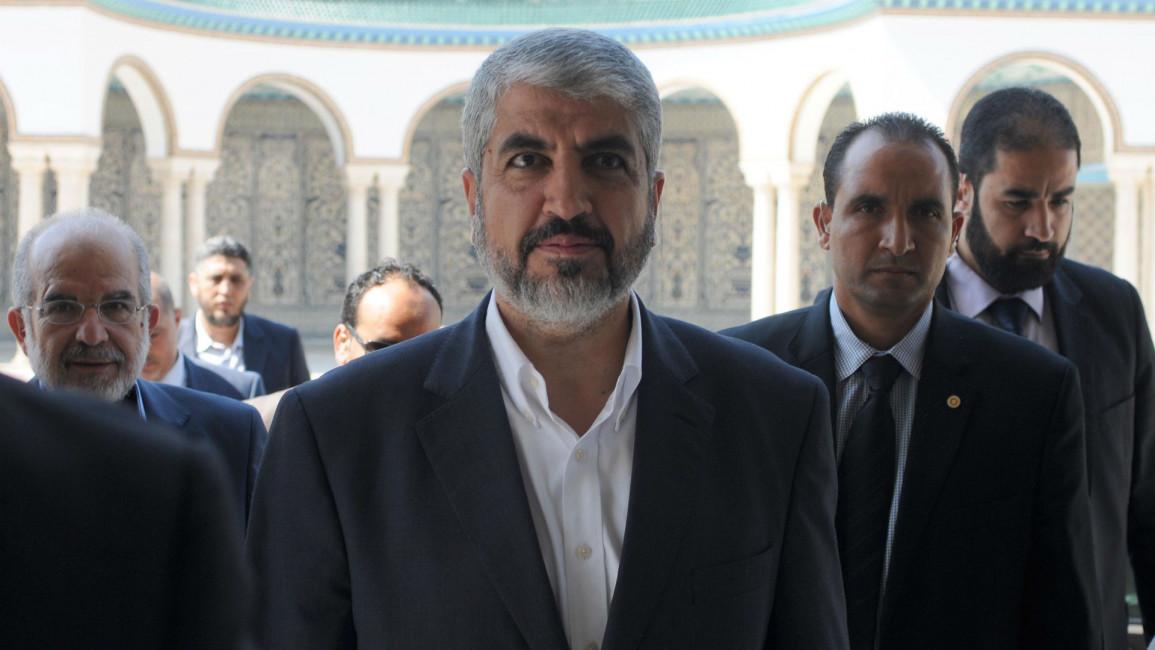
Why was the Hamas leader visiting Saudi Arabia?
The recent visit by the chairman of Hamas' political bureau, Khaled Meshaal, to Saudi Arabia can be explained in a number of ways - especially as the movement did not clarify what happened in Riyadh and only released a short statement describing the visit as successful, and a promising start to rebuilding "historic relations with [Arab] brothers".
Iran, Egypt, the UAE and the Palestinian Authority explained the visit differently.
Iran linked the visit to the situation in Yemen, as it believes Saudi Arabia is attempting to use Hamas against it and the Houthis.
The Iranian Fars and Mehr news agencies and Ghanoon newspaper, as well as the pro-Hezballah Lebanese paper al-Akhbar all harshly attacked Hamas and claimed the movement was going to send 700 fighters - trained to fight in rugged terrain - to Yemen in response to a Saudi request.
| Egypt and the UAE saw the visit as part of Riyadh's new focus on rapprochement with the Muslim Brotherhood. |
Egypt and the UAE saw the visit as part of Riyadh's new focus on rapprochement with the Muslim Brotherhood - which represents a "point of disagreement between Cairo and Riyadh", according to commentators.
In Egypt, al-Bawaba, known to be close to the Egyptian security services, reported that Cairo had informed Riyadh of its refusal to discuss any similar rapprochement with Hamas because of its Brotherhood roots.
The paper added Egypt informed all mediators it could not be part of any project that involved Hamas - as the group represented a threat to "Arab national security".
In the UAE, the chief of Dubai's Police, Dhahi Khalfan, took to Twitter to attack King Salman's policies regarding what he described as "positive overtures towards Islamists expressed by Riyadh".
As for the Palestinian Authority, Hamas' political rival, it is apprehensive of the outcome of Meshaal's Saudi visit, as expressed by Nabil Shaath, of Fatah's Central Committee.
"We hope that the Riyadh meetings push for unity and not something that Hamas interprets as giving more power to be independent in Gaza," said Shaath.
Respective interests?
These interpretations of the visit are all linked, coming just days after Iran's nuclear deal and coinciding with the visit to Riyadh by the prominent Yemeni Brotherhood figure, Abdul Majeed al-Zindani.
However, to explain the reasons behind Meshaal's Riyadh trip, we must know what Hamas wants from Riyadh and what Riyadh wants from Hamas.
Hamas wants Arab support and an end to the siege on Gaza. However, the possibility that Saudi Arabia wants to play a larger role in the Palestinian issue, especially at the moment, is highly unlikely.
Riyadh has plenty to worry about, especially in light of its regional conflict with Iran - and the fact that none of the battles currently raging in the region have been resolved in Riyadh's favour.
There is also the very real possibility Iran will gain regional strength and influence after its nuclear deal.
| It is absurd to believe Iranian claims that Hamas will send its forces to fight the Houthis in Yemen. |
What does Riyadh want from Hamas?
It is absurd to believe Iranian claims that Hamas will send its forces to fight the Houthis in Yemen, as Saudi Arabia would neither think to make such a request - nor would Hamas accept such a request, not to mention the fact that such a plan could not in any way be realistically implemented.
Saudi Arabia has two goals: one strategic and another tactical.
Its strategic goal is to fold Hamas into the Sunni regional axis, due to the movement's standing among a large segment of Arabs and Muslims - and to distance it from Tehran, thus denying Iran the opportunity to claim it supports the Palestinian people and the resistance.
Its tactical goal could be that to use Hamas to mediate between the kingdom and the Yemeni Islah party - especially as media reports mentioned such efforts were underway a few months ago.
Both Hamas and Riyadh have denied such claims.
Opinions expressed in this article remain those of the author and do not necessarily reflect the opinions of al-Araby al-Jadeed, its editorial board or staff.
This is an edited translation from our Arabic website.




